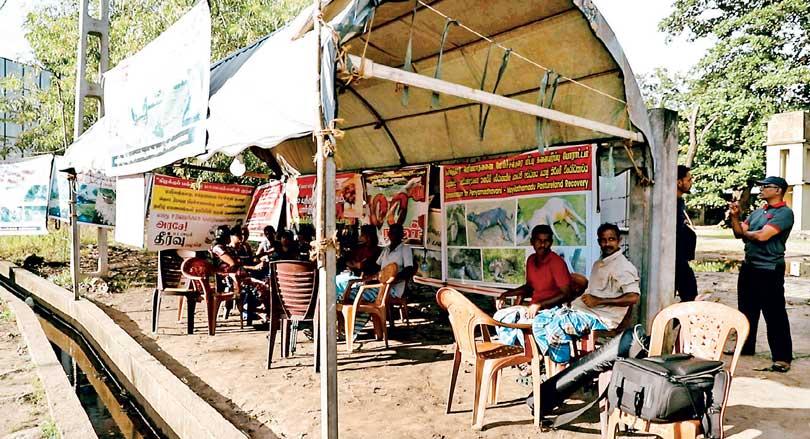Reply To:
Name - Reply Comment

Dairy farmers in Mailaththamadu staging a protest
We are unable to provide one-tenth of the contribution made to the daily milk collection in the East since our herds aren’t properly fed. We are now forced to look for smaller pasture lands which are not sufficient to produce the daily required quantity of milk
S. Sivaraja, Dairy farmerThis is typically a repeat of the colonisation program carried out in the 1950’s to expand Sinhala-Buddhist settlements in the North and the East
Murugupillai Chinnathambi, Dairy farmer from SittandiThe problem of the dairy farmers in the East is not only about denying grassland to farmers, but also amounts to subtle moves made to ignite racial disharmony in the country
Rev. Fr. Sherard Jayawardena
 A solution to the woes of dairy farmers in Mailaththamadu in Batticaloa is still not in sight despite the loss of around 1,400 cattle that provide the daily income for a large number of farmer families in the East.
A solution to the woes of dairy farmers in Mailaththamadu in Batticaloa is still not in sight despite the loss of around 1,400 cattle that provide the daily income for a large number of farmer families in the East.
The call to end the problem caused by forceful settlements from the South has fallen on deaf ears. Farmers said those who had settled in the area have done so with the backing of politicians. They added that the cattle were killed by poisoning and causing injuries to them.
Mailaththamadu has been the grazing ground for cattle in Batticaloa for over five generations. It has provided a stable income for many farmer families in the East.
All avenues exhausted
Muthusivalingam, a dairy farmer of Mailaththamadu, said that farmers have exhausted all avenues for an amicable solution to the issue that has existed since 2016 and worsened after Gotabaya Rajapaksa became president in 2019.
“We will never give up our rights and the struggle to win it at any cost. Farmers will not cow down to the threats and intimidations of various forces in the area,” he said. Muthusivalingam said that the protest by dairy farmers had reached its 200th day in March this year.
Dairy farmers in the East have been making a salient contribution to the dairy industry in the country for many years until they were deprived of the grassland in Mailaththamadu.
“We are unable to provide one-tenth of the contribution made to the daily milk collection in the East since our herds aren’t properly fed. We are now forced to look for smaller pasture lands which are not sufficient to produce the daily required quantity of milk,” S. Sivaraja, a dairy farmer who lost ten cows recently said.
Murugupillai Chinnathambi, a dairy farmer in Sittandi said that there is no point in talking about developing local industries and fostering ethnic harmony if people in the area are not allowed to engage in their occupation.
“This is typically a repeat of the colonisation program carried out in the 1950’s to expand Sinhala-Buddhist settlements in the North and the East,” he said.
Settlers from the South occupying the grassland justify their action on the grounds that they are protecting the crops and the herds grazing in the land.
Appeals
Repeated appeals to the authorities to put an end to the issue or provide alternative land for grazing have failed to provide results.
While the status quo remains the same, it is alleged that moves are in place to bring the land under the Mahaweli Development project.
Farmers have urged the authorities to pay urgent attention to their issue and solve the problem which has aggravated due to the loss of income to meet their daily needs.
Rev. Fr. Sherard Jayawardena, who has been following the developments of the dairy farmers’ issue and stood by them to win their rights, said, “The problem of the dairy farmers in the East is not only about denying grassland to farmers, but also amounts to subtle moves made to ignite racial disharmony in the country”.
He said that those who have encroached and started planting various crops have defiled court orders and acted with impunity.
Mailaththamadu has been the feeding ground for cattle in the Batticaloa district since the early 1970s.
Sri Lanka currently produces around 40 percent of its annual milk requirement and imports the rest to meet the growing domestic demand.
Around US$300 million is lost to the state coffers annually to import milk and meet its daily requirement.
Dairy farming in the North and the East was severely hampered by the three-decade war. Farming partially resumed after the end of the war in 2009. However, farmers in Mailaththamadu have been facing numerous obstacles from time to time until they were forced out of the land after 2019.